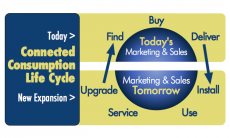You’ve complained about it–c’mon, admit it. Sometimes your customers do the most irrational things. I mean, there’s no explanation for some of the dumb things customers think and do, right? Wrong. Dan Ariely tells us that customers are actually predictably irrational. As marketers we’re often flummoxed by the unusual choices that customers make. Behavioral economists, on the other hand, seek to understand the motivations behind apparently irrational behavior and then predict it. This is a highly useful skill for a marketer to have also. Being able to predict customers’ or target customers’ behavior, however irrational, is an essential tool of the trade.
Dan Ariely’s book Predictably Irrational checks out some of the irrational behavior in the market and seeks to understand how to predict it. In the video example below, Ariely explains why discounting a product leads customers to expect a lower quality; as an alternative, he proposes that instead of discounting a product, the product can be presented differently or re-branded and maintain the expectations of quality.
Another example which struck close to home for this dedicated coffee-drinker was Ariely’s experiment with a coffee-tasting on the MIT campus. In some scenarios, the coffee was presented along with a series of exotic condiments, which were unused. In some scenarios, the coffee was presented with only usual additives. In the scenarios where the exotic condiments were available, the coffee was scored as tasting better—even though it was in fact identical in all scenarios.
Surely it should have no rational bearing on the intrinsic quality of a product if it is bought at a discount. Similarly, the accessories available for a product should not influence our perception of the value of that product, especially if they aren’t even used. But clearly it does, and knowing that gives a marketer an advantage in presenting one’s product to the market. Consider for a moment the iPod market: the Apple store doesn’t hold sales and the accessory market for ipods is vast although the majority of iPod owners make do only with ear buds. Ariely would argue that both these factors contribute to the perceived value of the iPod.
How does your product compare? Do you discount your product to the detriment of its perceived quality? Are you offering enough exotic options to improve the perceived quality of your product?






